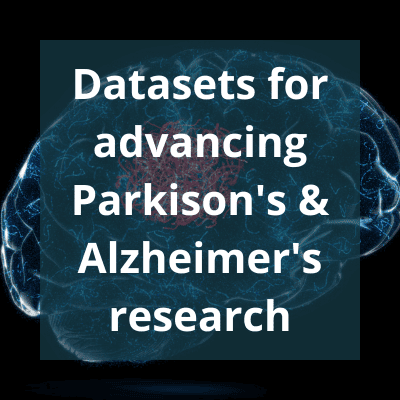Need a Parkinson’s dataset or Alzheimer’s dataset for research?
- 26th May 2023
- Posted by: Breige McBride
- Categories: Bioinformatics, CNS

If you require a Parkinson’s dataset or Alzheimer’s dataset to further your research, you will find some useful resources below.
In the course of our work applying bioinformatics analyses to various datasets to further our client’s research projects in drug discovery and development, we use data from various publicly available sources.
For a few clients recently, we have been using Parkinson’s and Alzheimer’s datasets made publicly available via research foundations. Research foundations can be a great resource for research datasets as they often have large data repositories focussed on a specific condition or disease. Also, the data is often made available for free or at low cost to encourage research advances to benefit those with that disease or condition.
Parkinson’s dataset available to researchers
The Michael J. Fox Foundation for Parkinson’s research, which champions data sharing for research progress, has 6 Parkinson’s datasets currently available. You can learn about each of them below.
Parkinson’s Progression Markers Initiative (PPMI)
This ongoing longitudinal study collects clinical, imaging and genetic data as well as biological samples to further biomarker discovery and validation and therapeutic development.
PPMI RNA Sequencing Project
This project gathered transcriptomics data from raw sequencing reads of 1,600 PPMI whole blood samples.
Fox Insight
This online study collects data from patients about their lived experience of Parkinson’s disease, as well as genetic data via a collaboration with 23andMe.
BioFIND
This observational clinical study aims to identify and verify biomarkers of Parkinson’s disease, using clinical data and biological samples from participants with and without Parkinson’s disease.
LRRK2 Cohort Consortium (LCC)
This consortium of three closed studies created a Parkinson’s database and biorepository. These store data and samples from people, with and without Parkinson’s disease, who carry mutations in the LRRK” gene.
Levodopa Response Trial Wearable Data
This study assessed the feasibility of using wearable sensor data to measure the severity of Parkinson’s disease symptoms.
Alzheimer’s dataset available to researchers
The Alzheimer’s Disease Sequencing Project (ADSP) aims to understand the genetic architecture of Alzheimer’s disease and related dementias. The study makes data (such as genotyping and sequencing data) available through NIH-approved data repositories. The data comes from individuals characterized for AD/ADRD diagnoses. Biospecimens (DNA and/or other biomarkers and tissues) are also available.
The ADSP data set (NG00067 -ADSP Umbrella) is available via the NIAGADS Data Sharing Service. You can apply for access here.
Data Landscaping for Alzheimer’s and Parkinson’s datasets
Wondering what other datasets are available to further your Alzheimer’s or Parkinson’s disease research? We offer a comprehensive data landscaping service to identify all datasets currently available to assist with your particular research goals. We score these in terms of relevancy to your research so you know exactly which ones to focus on. What’s more, we also offer a data mining service to reveal the relevant insights in the datasets that will advance your research. Learn more about our data landscaping and data mining services.
Bioinformatics Data Analysis from Fios Genomics
No matter where your Parkinson’s dataset or Alzheimer’s dataset comes from, in-house or public domain, we can analyse it for you. Using bioinformatics approaches, we turn large data sets into actionable information. We can also integrate numerous datasets together, giving you the overall picture of what the data is telling you, as well as revealing insights to inform the next steps of your research. To advance your research, contact us today! You can also access our example bioinformatics analysis reports for Alzheimer’s research data using the form below.
Request a sample of our analysis reports using publicly available Alzheimer’s datasets
This report describes the analysis of a publicly available microRNA-seq (miRNA-seq) data set deposited in the NCBI BioProject repository PRJNA670793, generated to investigate miRNAs associated with Alzheimer’s disease in the human brain as part of a previously published study (Li & Cai, 2021, Front. Neurosci.).
The data analysed in this report were obtained from post-mortem superior temporal gyrus (STG) samples of Alzheimer’s disease patients and cognitively normal donors. Our analysis investigates differences in STG miRNA expression profiles between these two groups to identify dysregulated miRNAs and perturbed functional pathways as a result of Alzheimer’s disease in this brain region.
Author: Breige McBride, Content and Social Media Manager, Fios Genomics
Reviewed by Fios Genomics Bioinformatics Experts to ensure accuracy
See Also:
How we can help with CNS research
How to reduce the drug development timeline
Bioinformatics reveals secrets of the gut microbiome
Leave a Reply
You must be logged in to post a comment.

